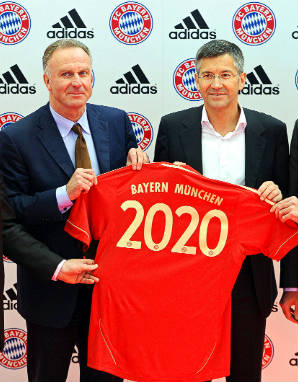"FIFA needs a restart," says Rummenigge
One of the men in question, Adidas CEO Herbert Hainer, was broadly speaking in support of the soccer's governing body and its embattled president, Sepp Blatter. Hainer forcefully rejected suggestions that his company's sponsorship of an organization dodged by persistent allegations of corruption was damaging the brand.
"We work together with our partners and talk to them to behind the curtains, we don't shout (criticism) in public," he told SI.com, calmly.
On his right, Karl-Heinz Rummenigge bit his tongue. A little later, however, the Bayern Munich CEO, 9 percent of whose club is owned by Adidas as a strategic partner, used a fairly innocuous question to launch a stinging attack on the lack of progress in Zurich in recent months. Now it was Hainer's turn to gaze at the floor, visibly uncomfortable in his chair, too.
As Rummenigge was laying out the case against FIFA, however, it became conceivable that the two men were actually engaged in an elaborate "good cop, bad cop" exercise. Hainer was dangling a giant carrot (in the form of Adidas' $175 million sponsorship deal covering the period until the next World Cup in Brazil, 2014) , and Rummenigge, the head of the 200-strong European Club Association (ECA), was waving an imaginary stick. The 56-year-old, a former world class striker with Bayern, Internazionale and West Germany, did not explicitly renew his threat to lead a breakaway of the clubs from FIFA and UEFA. But he did warn that he was prepared to sign the next contract ("Memorandum of Understanding") governing relations between soccer's principal shareholders beyond 2014 if FIFA -- and to a lesser extent UEFA -- guaranteed "(the principles of) transparency, democracy and (good) governance."
"If you cannot convince the (soccer) family to follow you, you are lost," he added, hinting darkly at the clubs' nuclear option, a refusal to release players for international tournaments.
FIFA's and UEFA's ever-burgeoning fixture calendar and disagreements about financial compensation for the release of players are at the heart of Rummenigge's problems with soccer's governing bodies, aside from the wider issue of FIFA's bad PR.
"The image of FIFA is a disaster, it could not be worse," he said. "Every company or club would collapse if they had similar problems. You cannot ignore these issues in today's world. You have to convince the soccer world, and the whole world, that there is a restart. You can call it 'FIFA 2.0' or whatever you like. But you have to show that you are serious."
Back in July 2011, Mr. Rummenigge had argued for "a revolution against the corrupt people" but his stance has apparently softened somewhat. He is now at least willing to consider the possibility that FIFA's promises of reform might be kept, even if his words betrayed some skepticism.
"I read about various commissions working (toward change) in the newspapers but I'm very curious, to tell you the truth, whether the answers will be convincing. FIFA have to realize that without the clubs, nothing would function."
Probably to Mr. Hainer's relief, Rummenigge declined the opportunity to call for Mr. Blatter's resignation.
"He has been elected by the federations, with a huge majority and standing ovations," he said. "We have to recognize and accept that. Now he needs to show that he's willing to change. We should give him a chance to change; we should give him a chance."
Even if Rummenigge's and Hainer's statements were not pre-coordinated, they were certainly well timed. This Wednesday, FIFA confirmed that Blatter and Rummenigge were due to meet for a round of negotiations regarding compensation. Agencies reported the soccer body's willingness to raise the overall sum paid out to clubs during the 2014 World Cup to ?55m. Whether Mr. Hainer managed to have a quiet word or two with Blatter on this occasion, too, was impossible to ascertain. But one would certainly hope so.





